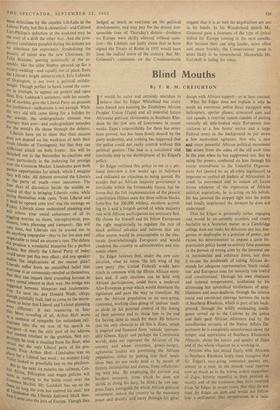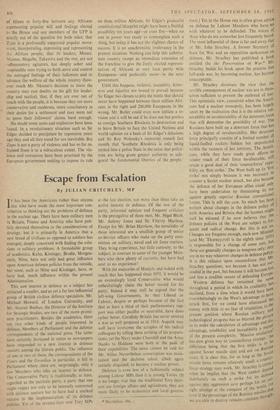Blind Mouths
By T. R. M. CREIGHTON
T would be naïve and certainly mistaken to ibelieve that Sir Edgar Whitehead has really
been forced into banning the Zimbabwe African Peoples' Union (Zapu) and all potential future Africanist political movements in Southern. Rho- desia by the few acts of lawlessness in recent weeks. Zapu's responsibility for them has never been proved, but has been firmly denied by the party leadership, and nothing has happened that the police could not easily control without this political gesture. The ban is a calculated and inevitable step in the development of Sir Edgar's policy.
Sir Edgar outlined this policy to me in a per- sonal interview a few weeks ago in Salisbury and indicated no objection to being quoted. He accepts that an African majority government is inevitable within the foreseeable future, but be- lieves that the full implementation of the present constitution (fifteen seats for three million blacks, forty-five for 200,000 whites), elections accord- ing to it and a longish period of white majority rule with African participation are necessary first. He claims for himself and his fellow Europeans the right magisterially to regulate the rate of black political advance and believes that any other course would be unacceptable to the elec- torate (overwhelmingly European) and would condemn the country to administrative and eco- nomic chaos.
Sir Edgar believes that, under the new con- stitution, what he terms 'the left wing of my own party' (the United Federal) would have much in common with the fifteen African mem- bers and, if only elections can be held with African participation, could form a moderate Afro-European group which would dominate the legislature and pave the way to transition. He sees the African population as art easy-going, contented, working-class group of 'natives' ready to abide by his paternal control of the timing of their advance and to that* him in the end for having done so much for them. He believes that the only obstacle to all this is Zapu, which is inspired and financed from 'outside' (presum- ably Ghana, Egypt and perhaps the Communist world), does not represent the Africans of the country and whose extremist, power-hungry, agitatorial leaders are preventing the African population, either by putting into their heads ideas they do not really hold or by means of threats, intimidation and duress, from collaborat- ing with him. By employing the sternest and harshest measures, from which he does not shrink in doing his duty, he thinks he can sup- press. Zapu, extinguish the whole African political movement, reduce the country to the necessary peace and docility and carry through his great
design with African support—or at least consent.
What Sir Edgar does not explain is why he needs an enormous police force equipped with helicopters, spotter planes, armoured cars and riot squads, a reservist system capable of putting virtually all able-bodied male Europeans into uniform at a few hours' notice and a large Federal army in the background to put down a few malevolent agitators. Nor why a new and more powerful African political movement has arisen from the ashes of the old each time in the past when he has suppressed one. But by using the powers conferred on him through his recent amendment to the Unlawful Organisa- tions Act (passed by an all-white legislature) to imprison or restrict all leaders of Africanism, to crush its movement and to outlaw all future forms whatever of the expression of African political aspirations, he is acting on his beliefs. He has jammed the stopper tight into the bottle and fatally imprisoned the ferment he does not understand.
That Sir Edgar is personally rather engaging and would be an amiably eccentric and crusty bachelor in a Somerset manor or a Cambridge college does not make his delusions any less dan- gerous or deplorable in a position of power, nor excuse his determination to impose a quite im- practicable policy based on entirely false premises in the pursuit of wrong aims by the immoral use of intimidation and arbitrary force, nor does it excuse the doubletalk of calling African de- mands for adequate representation 'black racial- ism' and European ones for minority rule lawful and constitutional. Through his own obstinate and isolated temperament, reinforced by his distressing but symbolical misfortunes of near- blindness and near-deafness, through the intense social and emotional cleavage between the races in Southern Rhodesia, which is part of his back- ground, through the wildly misleading intelli-
gence served up to the Cabinet by the police and their paid African informers and by the antediluvian servants of the Native Affairs De- partment he is completely misinformed about the temper and aspirations of Southern Rhodesia's Africans, about the nature and quality of Zapu and of the whole situation he is working in.
Anyone who has mixed freely with Africans in Southern Rhodesia lately must recognise that Sir Edgar's easy-going contented natives are,
almost to a man, in the remote rural reserves now as much as in the towns, ardent supporters of Zapu, bitterly resentful at their position in
society and of the treatment they have received from Sir Edgar in recent years; that they do not
trust Sir Edgar an inch and would not follow him a millimetre; that co-operation in a ratio of fifteen to forty-five between any Africans representing popular will and feelings elected to the House and any members of the UFP is utterly out of the question for both sides; that Zapu is a profoundly supported popular move- n-cnt, incorporating, expressing and representing the. African people; that its leaders, Messrs. Nkomo, Mugabe, Takawira and the rest, are not inflammatory agitators, but deeply sober and responsible men trying to both serve and control the outraged feelings of their followers and to advance the welfare of the whole country (how- ever much Mr. Nkomo's decision to leave the country may cast doubts on his gift for leader- ship and tactics); that, if they arc ever out of touch with the people, it is because they are more conservative and moderate, more conciliatory in their desire for a settlement and may seem not to press their followers' claims hard enough. No doubt some arms and explosives have been found. In a revolutionary situation such as Sir Edgar decided to precipitate by repression years ago they and all they stand for are inevitable. But Zapu is not a party of violence and has so far re- frained from it to a miraculous extent. The vio- lence and extremism have been practised by the European government seeking to impose its rule on three million Africans. Sir Edgar's gradualist constitutional blueprint might have been a fruitful possibility ten years ago—or even five—when no one in power was ready to contemplate such a thing, but today it has not the slightest chance of success. It is an anachronistic irrelevancy in the present situation. Nothing can help this unfortu- nate country except an immediate extension of the franchise to give the freely elected represen- tatives of Africans at very least parity with Europeans—and preferably more—in the next government.
Until this happens, violence, instability, bitter- ness and injustice are bound to prevail because Sir Edgar has chosen to join the battle that should never have happened between three million Afri- cans in the right and 200,000 Europeans in the wrong. Mr. Butler could even now initiate a re- vision and it will be sad if he does not but prefers to consign Southern Rhodesia to destruction and to leave Britain to face the United Nations and world opinion on a basis of Sir Edgar's delusions and Sir Roy Welensky's immortal remark last month that 'Southern Rhodesia is only being turned into a police State in the sense that police men are being given greater authority to safe- guard the fundamental liberties of the people.'



































 Previous page
Previous page